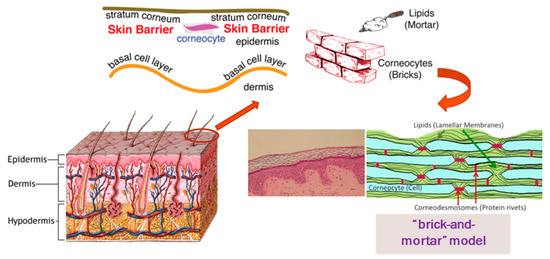In the quest for “texture-free” skin or quick acne fixes, we often end up putting our skin through a lot. And whether we achieve those results or not is debatable, one thing is for sure: our skin’s barrier takes a hit. Damaged barriers are so common, most of us don’t even realize it’s happening!
So, today, we’ll dive deep into all things barrier - how it functions, signs of barrier damage and how to repair it.
What is the skin barrier?
 Via: https://www.mdpi.com/2079-9284/6/3/52/htm[/caption]
Via: https://www.mdpi.com/2079-9284/6/3/52/htm[/caption]
The skin barrier, also known as the moisture barrier, is fundamentally made out of three lipids: ceramides, cholesterol and essential fats. These lipids cooperate to stop water loss and to shield your skin from external aggressors.
When we talk about skin barrier, we're generally referring to the outermost layer of your skin, called the epidermis which contains three types of cells:
Keratinocytes - these cells have natural oils and ceramides that provide the glue which anchors skin cells together into a generally impermeable wall.
Melanocytes - these cells produce melanin which ingests ultraviolet radiation and shields fundamental structures from UV damage. Melanin also gives the skin its regular complexion.
Langerhan cells - these cells help the skin build an immune response to bacteria and viruses.
What does the barrier do?
The fundamental role of your skin’s barrier is to keep the good stuff in and the bad stuff out. It protects the internal layers from aggressors like pollutants, harmful chemicals and UV rays. Since the skin barrier prevents water loss, it also assists the body by helping it hold onto natural moisture. If the outermost layer of the epidermis doesn't contain sufficient water, the skin will appear dry and rough and lose its elasticity.
Skin that is not hydrated well is incapable of maintaining an unblemished skin barrier, leaving it prone to nutrient loss as well as external damage.
What can compromise the skin barrier?
There are several factors that can damage your skin’s barrier. Some factors are genetic, such as — like atopic dermatitis, otherwise called eczema, an inflammatory skin condition. Age is another factor, as over time your skin’s capacity to produce oil and maintain the oil-moisture balance diminishes.
Now, age and genetics are inevitable and beyond our control. What about factors that are within our control? There are common things we do on a daily basis that can also compromise the skin’s barrier.
These include:
Over-cleansing
Over-exfoliation
Skipping sunscreen
Unmitigated stress
Lifestyle stressors (alcohol, smoking, lack of sleep, poor diet)
Exposure to harsh environmental elements (strong winds, pollution)
How to tell if your skin’s barrier is compromised?
Dehydrated Skin:
When your barrier is compromised, moisture easily escapes your skin leaving it dehydrated, rough and with a flaky texture. This also makes your skin appear dull.
Redness:
A damaged skin barrier has cracks that allow irritants and other aggressors to penetrate the skin, leading to allergies and inflammation.
Sensitivity:
An imbalance of lipids in the skin barrier hampers its functioning, further sensitising your skin. This may cause stinging or burning every time you apply products.
Acne:
Acne flare-ups can be an indication of a compromised skin barrier, as the bacteria that cause skin inflammation are all the more effectively able to penetrate the skin. In addition, a damaged barrier can also send your skin’s oil-producing glands into overdrive, causing excessive oiliness which in turn can also lead to breakouts.
How to fix it?
- Use gentle cleansers, such as a cleansing balm and a non-drying face wash (like our Calendula Cloud Cleanser). If you have dry skin, consider cleansing your skin only once a day (in the PM) and simply splash your face with water (in the AM). While you’re at it, also avoid rinsing your face with hot water, instead opt for lukewarm or cold water.
- Exfoliate your skin once or twice a week. If you’re using a physical exfoliator, keep it gentle and light.
- Limit the use of acidic skincare products in your routine. Use acidic actives around twice or three times a week. And as much as you can, opt for gentler serums. Your skin rarely needs super-strong actives!
- Moisturizing is key, no matter your skin type. In case of a damaged barrier, choose a moisturiser with Ceramides. It helps build, boost and strengthen the barrier, as well as keeps moisture and nutrients locked IN (for e.g.: the Barrier Boost Face Formula).
- Use sunscreen! Unchecked exposure to UV rays can speed up oxidative stress and also aggravate breakdown of nutrients, which can - you guessed it - weaken your barrier.
Your skin barrier is your body's cutting edge defence shield against everything the world tosses at you. Maintaining it is more than just a cosmetic concern. Remember to always keep self-care as your top priority. Don’t be too hard on yourself. Get an adequate amount of sleep, eat healthily and practice releasing stress for your overall health.

